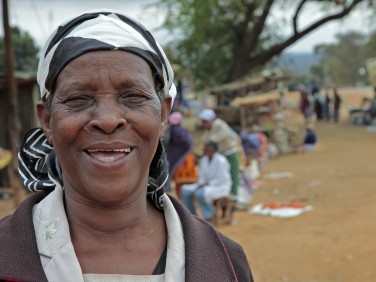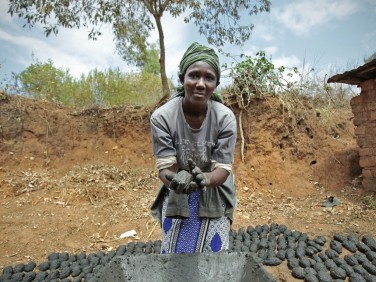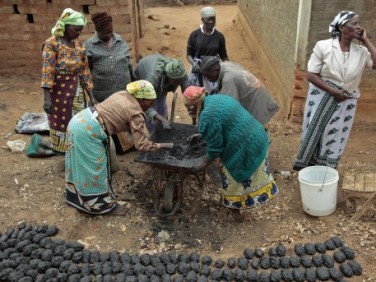
Meet Martha, the 68-year-old eco-entrepreneur
A semi-literate 68-year-old farmer living in a rural hamlet in Kenya, Martha Kimuyu is not your typical pioneering eco-entrepreneur. And yet she has launched a profitable ‘green fuel’ business which has multiplied her income by a factor of five.
A family of community leaders
When we meet Martha, it is immediately apparent that she is an influential member of her community. Leading community groups runs in her family: Martha’s mother was the chairwoman of a basket weaving group herself.
 When Martha turned 18, she decided to set up and chair her own group: “The people around me were just sitting around all day long, doing nothing productive, so I told them to come together to plant maize and onions”.
When Martha turned 18, she decided to set up and chair her own group: “The people around me were just sitting around all day long, doing nothing productive, so I told them to come together to plant maize and onions”.
Almost 50 years on and she is still the treasurer of the group, although as some of the members have died, their daughters have taken their place. Martha’s own daughter is also following in her footsteps and leads a self-help group in another village.
When Martha was widowed some years ago, she decided to take up a business to help to support herself. Coca Cola were offering loans to set up drinks kiosks and Martha seized the opportunity in the roadside market near her home. Although she managed to gradually pay off the credit, and diversify the range of drinks she sold , the income from the kiosk stagnated for many years at around 2,700 Kenyan shillings (KES) a month – around US $30, barely enough to survive on, let alone support the two orphaned grandchildren who came to live with her.
Seeing green
 When Hand in Hand came to the area in 2011, Martha signed up her group for Hand in Hand business training. A session on green, sustainable business opportunities triggered a bold idea in Martha’s mind: on a visit to her daughter, living in the Nairobi slum of Kawangware, she saw her daughter cooking with charcoal dust briquettes.
When Hand in Hand came to the area in 2011, Martha signed up her group for Hand in Hand business training. A session on green, sustainable business opportunities triggered a bold idea in Martha’s mind: on a visit to her daughter, living in the Nairobi slum of Kawangware, she saw her daughter cooking with charcoal dust briquettes.
Charcoal briquettes are made by mixing charcoal dust – which remains after the charcoal has been burnt – with water and soil as binding agents. The briquettes, invented ten years ago by some of Nairobi’s lowest income residents, are regarded as an exciting development by renewable energy experts. They typically reduce cooking-fuel costs by 90 percent, save trees and dramatically reduce the air pollution caused by cooking with charcoal.
At 68, Martha is not your typical eco-entrepreneur. And yet she has launched a ‘green fuel’ business which has multiplied her income by a factor of five
Martha decided to become the first briquette provider in the area. She convinced a few neighbours to collect and sell her their charcoal dust instead of throwing it out. To launch the briquettes into the market, Martha initially gave samples to her neighbours to try. Hand in Hand’s financial literacy training kicked in when she needed to set the price of this new product in her area: with the cost of raw materials at KES 80, she decided to set the price of the resulting briquette production at KES 150 to ensure she would make a profit.
Martha now earns 14,000 KES (US $163) a month. The increased income has made it much easier for Martha to feed herself and her grandchildren a more varied diet – buying additional produce in the market rather than having to rely solely on the produce of her “shamba” (own land).
An eco-pioneer
 Like many areas in Kenya, Machakos, the county where Martha lives, has experienced deforestation as trees are cut down to make coal. The hilly terrain is gradually eroding, aggravating the aridity of the climate and making it more difficult for families to subsist on family farming. The county has experienced famines in the last few years.
Like many areas in Kenya, Machakos, the county where Martha lives, has experienced deforestation as trees are cut down to make coal. The hilly terrain is gradually eroding, aggravating the aridity of the climate and making it more difficult for families to subsist on family farming. The county has experienced famines in the last few years.
So it is no surprise that the members in Martha’s group have lined up to learn how to make the charcoal briquettes, which generate an income and help to save trees. True to Martha’s spirit of being a community leader, she has also taken up Hand in Hand’s invitation for her to train groups further afield in the county.
Machakos, Kenya
Martha’s results
Monthly income 14,000 KES (US $163)
Became Hand in Hand trainer
Able to provide family a more varied diet
Next case study: Meet Palwasha, the trainer who returned home
